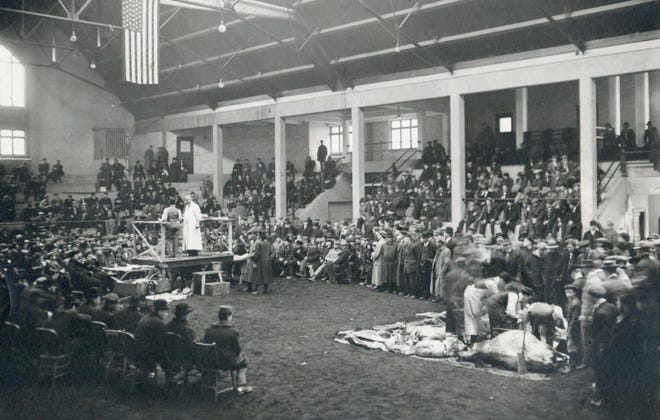
Which has graduated almost 600 budding farmers after training them in grazing practices as well as business planning for their new operations.
The school was founded and directed by Dick Cates, a Spring Green beef farmer who also served on the Wisconsin Department of Agriculture, Trade and Consumer Protection’s citizen policy board and various state sustainability panels.
He sent out a letter last week to people who care about the program – stakeholders that included graduates, financial donors and administrative people – and let them know what was happening to the program.
In a telephone interview with Wisconsin State Farmer, Cates said since his retirement he knows things are out of his hands. “I don’t want to be an outsider throwing stones or poking people in the eye. I understand programs come and programs go and people change. Like any large organization there are a lot of sous-chefs and there’s a new dean coming in.”
Still, he knows people who care about the program and who have supported it since its inception. He said that he wanted stakeholders to know what has come down recently from UW-Madison officials.
The School for Beginning Dairy Farmers (the name was later amended to add Livestock Farmers) was initiated in 1995 with funding from a two-year SARE (Sustainable Agriculture Research and Education) grant written by then directors of the Center for Integrated Agricultural Systems (CIAS), Rick Klemme and Steve Stevenson with strong support from a group of farm leaders in the grazing community. Cates said the grant allowed him to set up a curriculum to attract students who might not come to the UW’s Farm and Industry Short Course.
The new school was intended to help create beginning farmers recognizing that many of them would come from a different demographic – many did not grow up on farms but felt a pull toward grazing and livestock and wanted to be part of agriculture. Grazing is a passion for Cates but was also chosen as a key component of the program since farmers can get into grazing without a huge cash outlay, as they would have to for conventional kinds of dairy farming. It is also a production method that has considerable support from sustainability experts and consumers, he noted.
The grant under which he started the program was extended and once that funding source ran out, the Farm and Industry Short Course and CIAS started to help support the program, Cates explained. “Rick Daluge was a wonderful supporter of the program,” he said. Daluge served as director of the UW’s Short Course for 25 years.
Courses in the School for Beginning Dairy Farmers were taught under the auspices of the Short Course, Cates said.
Cates, who earned his PhD in Soil Science in 1983, never pursued a full-time appointment running the School for Beginning Dairy Farmers, but was a Senior Lecturer in the Soil Science Department at the UW-Madison. He continued to run his family’s beef cattle operation in Iowa County with 800 head on grass, some of them farmed out to far-off places – Florida, Mississippi, Minnesota and Iowa – as well as on his own land in Wisconsin.
At one point with all of that far-flung production, his wife Kim recognized that the profit margin was much better if they sold sides and quarters directly to consumers. That started a new chapter for their farming operation, Cates said. Today their son and his wife run the business raising Angus and Jersey steers on grass.
Program may be homeless
In a letter last week to stakeholders of the School for Beginning Dairy Farmers, Cates notes that the program is still going strong. This is the second year that the program has offered a new three-credit, in-person course in Organic Livestock and Pasture Management in the Animal and Dairy Science Department.
He was shocked to learn that even though the Strategic Plan for the CIAS stated that “discussion is needed to determine where to move” the school, current leaders at CALS have recently told the school’s director not to find a new “home” for the program.
Endowment concerns
Cates said one of his main concerns in all the talk of calling a halt to the School for Beginning Dairy and Livestock Farmers is the money that was raised to create an endowment to help keep the school funded. “People, including graduates of the program, agency professionals and businesses who worked with the school’s graduates, gave money to the program because they believe that the mission to train the next generation is imperative,” he told us.
“We lose farms in Wisconsin every day and many of those young people who want to farm come from a different background, a different demographic. There are more and more people from outside of agriculture who need to be trained.”
Most of those who contributed to the endowment, which Cates said stands near $500,000 were also supportive of the pasture-based approach. Cates said that an additional approximately $100,000 was also raised to fund scholarships to students. “That needs to be earmarked for new and beginning farmers,” he said.
He says he’s reached out to stakeholders of the school because he “feels an obligation to the good people who stepped up and donated to this. Some had given money every year for 20 years or more.”
The endowment has been used to fund program activities, like providing stipends to farmers and speakers who came to share their knowledge with students. It also helped fund the general expenses of running the program.
For nearly 20 years, Cates and a group of bicycle enthusiasts did an annual “Ride to Farm” bike ride, traversing southern Wisconsin’s countryside as a way to raise money for the school.
Time to push back
While not wanting to pick a fight with the University’s College of Agriculture and Life Sciences, Cates pushed back on the idea that the school he founded – or even the UW’s Short Course for that matter — are no longer necessary because other, newer efforts have sprung up to fill some of those same needs. “Since when have we at the University of Wisconsin — the state’s Flagship University and Land Grant College — said that somebody else can do that better than we can; that we don’t think we need to do it.” he said. “I just can’t accept that conclusion.
“The UW has a commitment to the citizens of Wisconsin. When I was running the program, we had technical college students taking my classes along with veterans and Organic Valley farmers. There’s room for a diverse mix of those who want to begin farming in Wisconsin,” he added.
Cates said he understands that enrollment in the School for Beginning Dairy and Livestock Farmers has declined in recent years. When he was still involved there were 110-120 students a year in the Farm and Industry Short Course, the source of a portion of the WSBDF population and in recent years there have been fewer students.
He said that Nadia Alber, who worked with him for many years and then took over leadership of the program upon Cates’ retirement in 2018, needed help. “Trying to coordinate distance learning at places where we had students, like Fox Valley Technical College and County Extension offices, as well as fundraising and all of the other things that need to be done for the program. She needed help and wasn’t getting any.”
Redesign of programs
Heidi Zoarb, the Associate Dean for External Relations at the College of Agriculture and Life Sciences told us that the Farm and Industry Short Course is getting redesigned with the hope that it will enroll more students. The program redesign is likely to be announced in December and will probably not follow its former 16-week format.
Online learning can be problematic for some rural students due to lack of broadband availability, she said. In-person learning is being stressed in the redesign of the program since that allows students to take classes together and build networks that can carry them into their future careers in agriculture. “That was a consistent theme we heard,” from those who weighed in on the redesign of the program, she said.

The University of Wisconsin has offered the one- or two-year Short Course to high school graduates since 1885, allowing them to learn more about agriculture and take that information home to benefit their farms.
In an online listening session last April, many industry leaders voiced dismay over then-proposed changes, including switching from a for-credit, on-campus residential experience of 16 weeks, to a shorter more flexible, non-credit format. At that time, agricultural leaders also expressed dismay that the changes were being contemplated with little or no input from the farming community.
Zoarb said that the CIAS – which has been the umbrella program for the School for Beginning Dairy and Livestock Farmers — is also going through its own “refocusing process.”
Addressing Cates’ concerns about the School for Beginning Dairy and Livestock Farmers endowment, she said that all the funds are held at the Wisconsin Foundation and Alumni Association, a legal entity that “protects donors’ wishes.” Where programs change or are discontinued it is the legal obligation of the Foundation to work with UW-Madison to protect those donors’ wishes, she said.

























